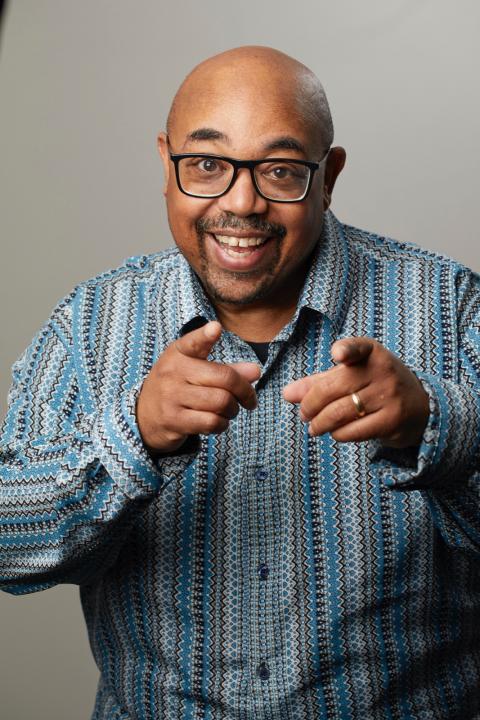Don't see what you're looking for?
Main Site
Berklee.eduCampuses and Schools

Kelly Davidson
George W. Russell Jr.
For media inquiries, please contact Media Relations
A native of Pittsburgh, Pennsylvania, George W. Russell Jr. is a performer, composer, and educator. He began taking piano lessons when he was 7 years old. Along with studying formally, he had the fortune of growing up playing at his local church. There was no written music at church, so he was given the opportunity to develop his ear.
As Russell continued studying music in college, he discovered jazz and its harmonies. It was then that he began to understand, from a theoretical viewpoint, what exactly he was playing both in church and in his classical repertoire. In that period of time, his unique fusion of gospel and jazz was beginning to form. His performances have ranged from solo piano to a groove-oriented jazz trio to a soulful, fresh-sounding larger ensemble that intrigues the listener's intellect and touches their soul. His playing is filled with passion, fire, soul, and spirit, which fits with his motto: "I would rather inspire than require."
Prior to becoming chair of the Harmony and Jazz Composition Department, Russell served as a professor of harmony and piano. He has been awarded the Ted Pease Award for Excellence in Teaching and the Curriculum Development Award for the Professional Writing and Music Technology Division. He has also been recognized with the highest award that Berklee gives to faculty, the Most Distinguished Faculty Award. He's known as a source of encouragement and inspiration to anyone who crosses his path.
- Leader, George W. Russell Jr. Trio
- Performances with Stanley Clarke, George Duke, Ernie Isley, Cecil McBee, Semenya McCord, Bob Moses, Tiger Okoshi, Billy Pierce, Richard Smallwood, Stan Strickland, and Lenny White
- Recordings include Schlickness, Worship in the Style of G, Jesus Is the Cure, Communion Volume I, and Communion Volume II; and work with Sandra Dowe and the George W. Russell Jr. Trio, and the Pianist and the Poet, as well as solo work
- Served as minister of music/chief musician for Jubilee (formerly New Covenant) Christian Church in Boston for 15 years
- Performs his original program Clap Your Hands, a narrative concert about gospel music in America, in several school systems in Massachusetts under the auspices of Young Audiences of Massachusetts
- Former chairman of the Jazz Department at the Pennsylvania Govenor's School for the Arts, 1986–2008
- Founder of Christian Musicians Fellowship of Boston
- Recipient, 2001 New England Conservatory of Music Gospel Music Award
- Berklee College of Music Distinguished Faculty Award
- Curriculum Development Award
- Ted Pease Excellence in Teaching Award
- Finalist, Martial Solar International Jazz Piano Competition
- M.M., New England Conservatory of Music
- B.S., Duquesne University
"I make a point of developing a relationship with each and every student in my classes. I learn everybody's names the first day. After that, there's not a class that goes by where I am not talking to every student, whether it's 'Hello, how are you?' or talking about class material."
"I mix in a little humor, I share a bit about myself and what I'm going through. I try to make it very personal. Then students can open up to receive the harmony package I'm trying to sell them. It's not the easiest subject to buy. It's all analysis. I try to teach it in a way that is compelling, so that students understand the application of it in their own performance."
"Music is harmony and melody. It's like a vocabulary. Without a vocabulary, it's difficult to speak. You can do it, but it sounds like you don't know what you're saying. As a player myself, knowing harmonic theory gives me a lot of security. I know two plus two equals four. I don't have to guess."
"In addition to harmony classes, I teach a gospel/jazz instrumental ensemble, in which we play a lot of my original music. I also teach an instrumental ensemble in mixed styles, where we deal mainly with improvising on the harmonic changes."
"I love sharing the information that I have with others. It is really inspiring to just be around the students, faculty, and staff, and to be a part of their development as musicians."